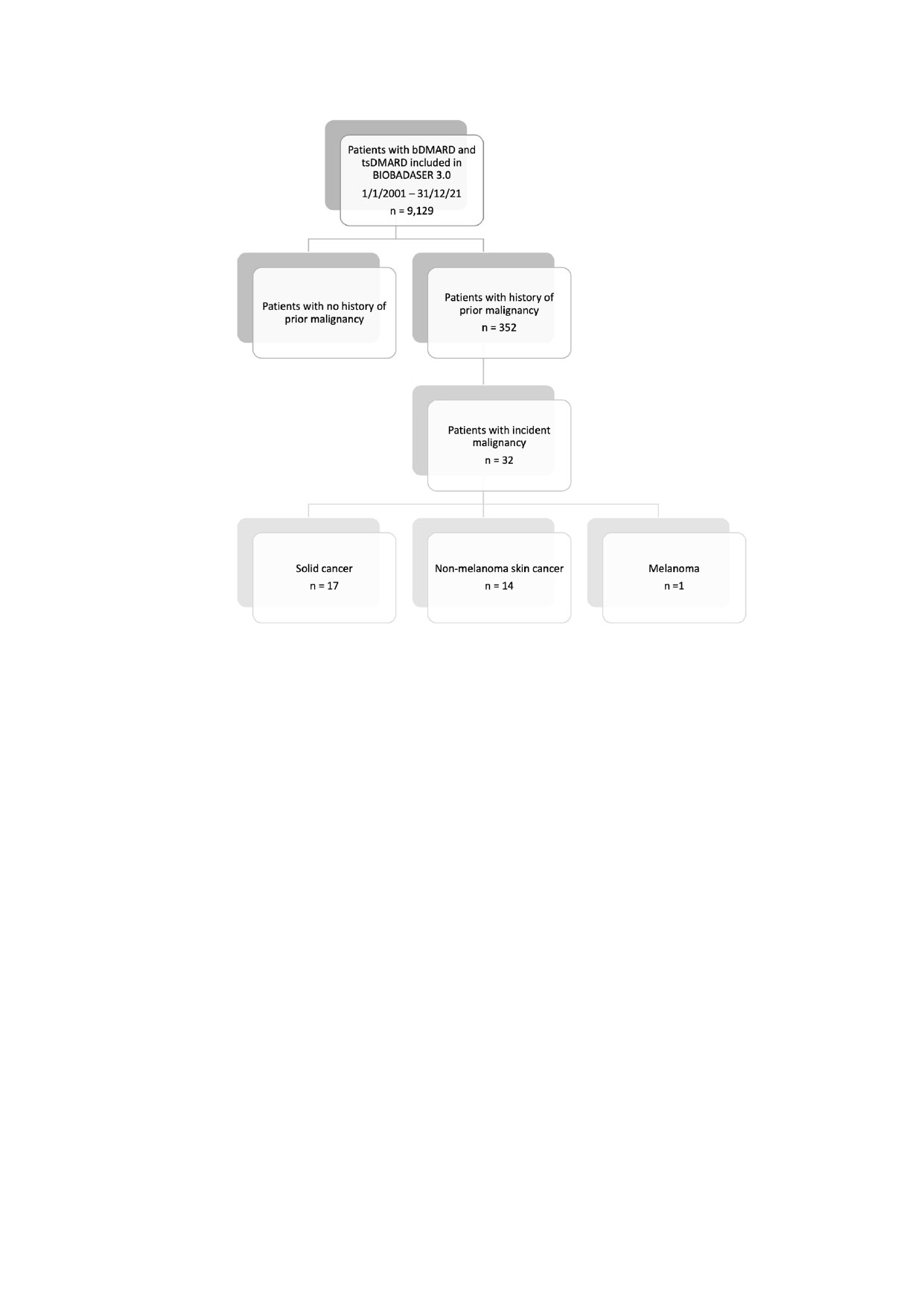Session Information
Session Type: Poster Session A
Session Time: 1:00PM-3:00PM
Background/Purpose: To investigate the occurrence and relative risk of incident malignancy in patients with rheumatic diseases and previous malignancy treated with biologic and targeted synthetic DMARDs (b/tsDMARDs)
Methods: Cohort study of patients included in BIOBADASER 3.0 up to 2021, treated with b/tsDMARDs and history of previous malignancy. Incident cancer was defined as any cancer (new primaries, local recurrence or metastases) during the drug exposure leading to therapy discontinuation. Incidence rates ratios of cancer per 1,000 patients-year (PY) and 95% confidence interval (CI) were estimated. Rates of incident cancer in tsDMARDs and other bDMARDs versus TNFi were compared.
Results: A total of 352 patients over 9,129 patients from BIOBADASER 3.0 had history of previous malignancy. Overall, there were 32 incident malignancies (17 solid cancer, 14 non-melanoma skin cancer and 1 melanoma) (Figure 1). Baseline characteristics of patients are shown in Table 1. The overall rate of incident malignancy was 27.1 (95% CI 18.6-38.3) events/1,000 PY, ranging between none events/1000 PY in the anti-IL17 group to 51.7 events/1000 PY in the anti-CTLA-4 group (Table 2). The overall rate of incident cancer did not differ significantly in patients exposed to JAKi [0.6 (95% CI 0.1-2.5)], anti-CD20 [0.3 (95% CI 0.1-1.4)], anti-IL6 [1.2 (95% CI 0.5-3.4)] or anti-CTLA-4 [1.3 (95% CI 0.5-3.6) versus TNFi therapy. The rate of different types of cancer (melanoma, non-melanoma skin cancer or solid tumors) did not differ between the different treatment groups when compared to TNFi.
Conclusion: The risk of incident cancer in patients with rheumatic diseases and previous malignancy did not differ between TNFi or other b/tsDMARDs
To cite this abstract in AMA style:
Molina J, Sanchez-Alonso F, Bohorquez C, Diaz-Torne C, Perez-Garcia C, Blanco-Madrigal J, Vela-Casampere P, Älvaro-Gracia J, Castrejon I. Cancer Risk with Biologic and Targeted Synthetic DMARDs in Patients with Rheumatic Diseases and Previous Malignancy: Results from the BIOBADASER Register [abstract]. Arthritis Rheumatol. 2022; 74 (suppl 9). https://acrabstracts.org/abstract/cancer-risk-with-biologic-and-targeted-synthetic-dmards-in-patients-with-rheumatic-diseases-and-previous-malignancy-results-from-the-biobadaser-register/. Accessed .« Back to ACR Convergence 2022
ACR Meeting Abstracts - https://acrabstracts.org/abstract/cancer-risk-with-biologic-and-targeted-synthetic-dmards-in-patients-with-rheumatic-diseases-and-previous-malignancy-results-from-the-biobadaser-register/



